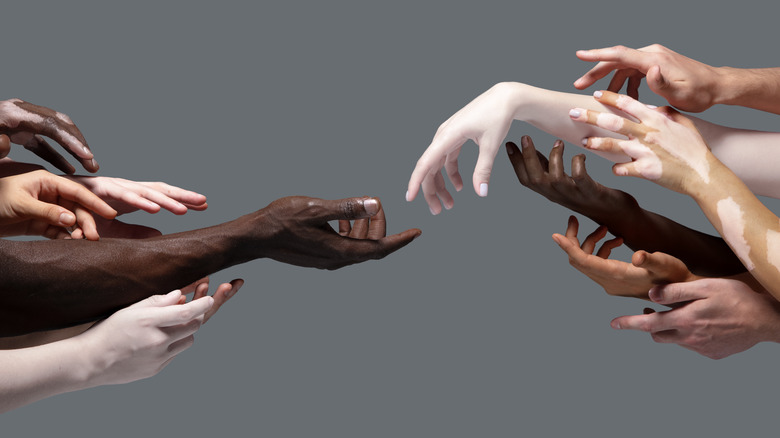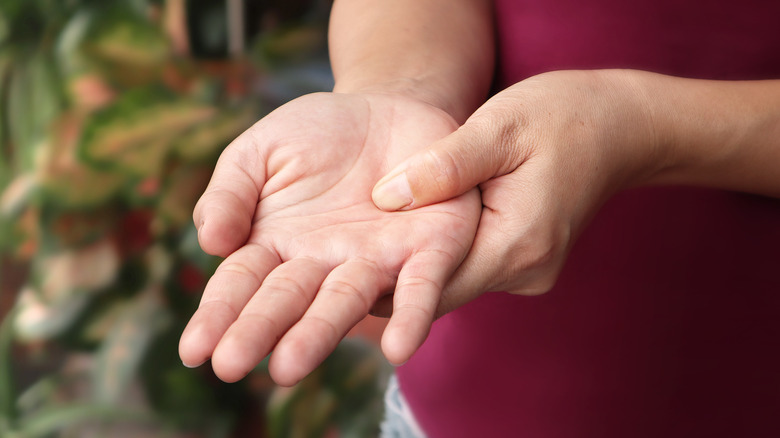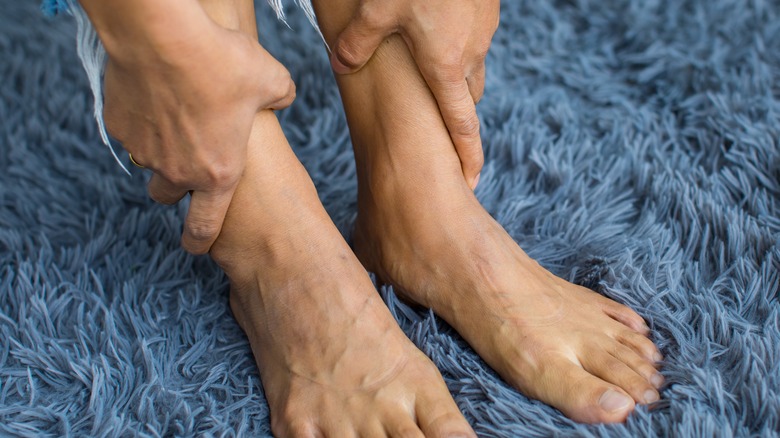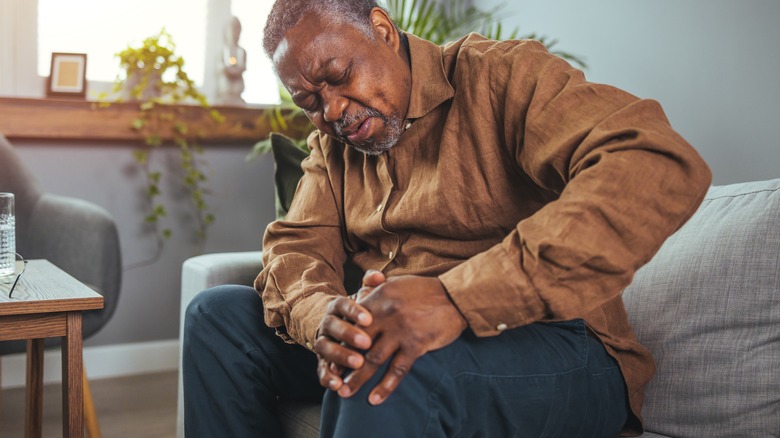The Side Effects Of Losing Your Sense Of Touch
Our senses are central to the way we experience the world. Through sound, touch, taste, smell, and sight, we're able to gather knowledge about the places around us, use that knowledge to operate safely within our environments, and retrieve sensory information that we find useful or pleasurable (per the Victoria State Government).
Out of all of our senses, touch is the one that we might have the most difficulty imagining a life without. While we can temporarily feel what it's like to not have our sight or our hearing by covering our ears or closing our eyes, touch "is so central and ever-present in our lives that we can't imagine losing it," says neurobiologist and "Touch: The Science of Hand, Heart, and Mind" author David Linden (via Vox). Touch is an important part of understanding the physical qualities of our environments, and the ability to feel things, particularly pain or heat, is crucial to our survival and self-protection, as research from the Noba Project states.
But touch isn't something that should just be taken for granted. Like all senses, the ability to experience the world through touch can be lost — and when that happens, a host of side effects can occur. We decided to lay them all out right here, so you can get a better idea of what would happen if you lost your sense of touch.
Loss of touch can be caused by injury
While it can be easy to identify the possible reasons behind the loss of some senses (such as the loss of sight because of damage to the eye), loss of touch is a bit more complex. After all, our skin is covered with millions of sensory receptors, with pain, heat, and pressure all being picked up when we touch things (per BBC Science and Nature). So how can we lose every single one?
The answer is a little more complicated than that. Loss of touch doesn't necessarily occur because all of these receptors are damaged; rather, it can happen when damage is done to the nerves that operate and process information from these receptors (via Bolt Burdon Kemp). This can be the result of an injury, a complication during a surgical procedure, or an accident in your day-to-day life. In such cases, the loss of touch may be localized. An injury to the median nerve, for example, which runs through the carpal tunnel in your wrist, may result in loss of sensation and touch ability in part of your hand. Other nerves, though, may cover bigger sections of the body, so you may lose total or partial sensation in larger areas.
Chronic conditions may also affect your sense of touch
The loss of touch ability and sensation may be sudden for some people, but in other situations, it can be the result of a chronic condition. One of these conditions is also one of the most common out there: Diabetes, which approximately 10% of all Americans have, according to the CDC.
A complication of both type 1 and type 2 diabetes is diabetic neuropathy, where the nerves in the body become damaged as a result of the condition (per Diabetes UK). There are several different types of diabetic neuropathy, which are classified based on the nerves they affect. One of these types, known as diabetic sensory neuropathy, impacts the nerves that control our sensory system, including our sense of touch. Diabetic sensory neuropathy can result in a loss of sensation in the limbs, and with this comes a host of complications, such as the inability to discern when things are hot or cold, to feel pain, to move effectively, and to manage injuries and prevent infection.
Other types of diabetic neuropathy may affect the nerves that help to operate our organs. This can result in a deterioration of essential bodily functions, like bladder control and digestion.
Some loss of touch is fairly common
While the thought of losing your entire sense of touch might be hard to contemplate given how integral it is to certain experiences, the partial loss of the sense is more common than you might think –- and you've likely already experienced it.
Hypoesthesia is the term given to the loss of the ability to sense things via touch, according to Healthline. Hypoesthesia can occur for a considerable number of reasons, some of which might be as simple as sitting in an awkward position for too long or sleeping with your arms above your head, which can limit blood flow (via Healthline). When this happens, certain parts of your body can temporarily lose the ability to sense pain, touch, or temperature.
Hypoesthesia can often be accompanied by a telltale pins-and-needles feeling. The good news is that in these cases, hypoesthesia is temporary and will usually go away. Other times, though, hypoesthesia can be persistent and may be caused by a host of underlying factors like arthritis, the development of tumors, certain vitamin or mineral deficiencies, or insect bites.
You may no longer be able to experience pain
Nearly all of us experience physical pain on a fairly regular basis, through things as simple as stubbing our toes or cutting ourselves accidentally while shaving. One of the side effects of losing your sense of touch would be the absence of these sensations, explains professor of biological sciences at Carnegie Mellon University Alison Barth (per Carnegie Mellon University). "When someone gets pricked by a pin, we know how information about that sensation travels from the skin to the spinal cord," states Barth. But when that sensation's function is inhibited in the first place, that information doesn't travel to the brain in the same way.
And while you might think that not experiencing pesky headaches and grazed shins might sound like a good thing, it's important to remember that the ability to feel pain is fundamental to survival. The acute pain response exists to protect us and to educate us to not repeat potentially damaging experiences that could threaten the safety of the human body, states Everyday Health. Although there are situations where limiting the pain sensation can be helpful (like during a surgical procedure), the total loss of it could be very dangerous.
You could be more prone to dangerous mistakes
Losing your sense of touch means that you lose an important aspect of how to process information, and this can lead to an increased risk to your health and safety. This is explained by Julie Malloy, who states that she "was born with a rare sensory illness that leaves [her] unable to feel pain, temperature, deep pressure, or vibrations in [her] arms, legs, and the majority of [her] chest and back" (via Women's Health Magazine).
As a result of her condition, Malloy says that she's more prone to unintentionally harming herself, as her inability to process temperature and pain leaves her more likely to scald herself with hot water. The lack of touch-pressure perception, normally determined by sensory receptors on the skin (according to research published in Braddom's Rehabilitation Care: A Clinical Handbook), can also be problematic. Malloy shares that while driving, she is unable to gauge how much pressure she is putting on the pedals. Despite this, Malloy perseveres, maintaining that there's still living to be done. "I try not to let my lack of touch stop me. I still take on challenges I probably shouldn't, like going roller-skating."
Losing your sense of touch could increase depression and anxiety
Touch is not just important for learning about the world around us. It also plays a vital role in contributing to better mental and emotional health. When you sense touch, the vagus nerve is activated, and this can calm your nervous system, reducing the number of stress hormones in your body and prompting the release of pleasure-inducing chemicals (per Healthline).
When touch is limited or you lose the ability to sense it, though, your regulation of the stress hormone cortisol is less rigorous (via WebMD). This can lead to a buildup, creating feelings of depression and anxiety in a state known as touch starvation. Individuals with this condition may experience negative emotions more often, become withdrawn, or have worse sleep.
Touch starvation can also have a strong effect on one's physical health. The release of cortisol can lead to higher blood pressure and a weakening of the immune system, which may potentially have knock-on effects for any current or chronic conditions you're experiencing. People who experience touch starvation may find it beneficial to do pleasurable activities (like socializing, working out, or even singing) that stimulate the release of oxytocin, dopamine, serotonin, and other neurotransmitters.
You may still be able to experience different types of touch
It may surprise you to know that there are actually two different types of touch systems. Both work in different ways, explains "Touch: The Science of Hand, Heart, and Mind" author and neurobiologist David Linden (via Vox).
The first touch system, named "discriminative touch," is the factual side of the sense, telling us where our bodies have made contact with something, how hard the touch is, and what kind of motion it has. The second type of touch, Linden states, is called "emotional touch," which creates an emotional response and is crucial for building social bonds.
These two systems don't operate via the same sensory receptors on the skin. "It's a completely different set of sensors and nerve fibers that wind up in a different part of your brain," says Linden. And this means that if you lose one of your touch systems, you may still retain the other. Linden points to a case study of a woman who has primary sensory neuropathy. While she isn't able to experience mechanical touch and discern specific physical information via touching things, "[i]f you caress her forearm, or her leg, or another area of skin, she can tell roughly where it is, and she knows it's pleasant. That's because she has retained a different, emotional touch system."
Touch can affect your first impressions of people
"First impressions matter" is a well-known bit of conventional wisdom. But we don't just process information about a person in those first crucial few seconds through visual stimuli and mental interpretation; our sense of touch can also play a big role. This can happen in pretty surprising ways, as a study published in the journal Science shows.
The researchers looked at the effects of holding objects of different temperatures when someone met a new person, and how said object's temperature could affect how they perceive them. They found that when people were holding a warm object when meeting someone new, they were more likely to state that the person made a warmer, kinder first impression. Holding a cold object, on the other hand, meant they were less likely to perceive the person as warm and friendly.
Losing our sense of touch, therefore, could influence what impression we get of people and things. This may not just be the case with the temperature of objects we're holding, but with weight too, as detailed by a further study published by the Association for Psychological Science. Findings revealed that when people held heavy clipboards, they were more likely to consider certain situations and objects to be more important, whereas holding lighter clipboards made things seem less important.
Your sense of coordination and movement is impaired
Touch isn't simply about feeling nice when someone strokes your arm or knowing that a kettle is hot or cold. It also plays a huge part in how you move through the world.
Touch is vital to ensure you stay coordinated, with the sensory receptors on your skin constantly giving your body information that informs your movement (per Arizona State University). It's always interacting with your proprioceptive senses (which gives you the ability to tell what position your body's in without having to check visually, explains Pathways) to make continuous adjustments while you're walking, running, or simply sitting in a chair (via Griffin Occupational Therapy).
But when you lose your sense of touch, you lose a vital means of keeping coordinated. This means that you'll have to rely on your other senses more heavily to ensure you're moving effectively, like sight -– which, as you might imagine, is pretty impractical, as you can't constantly be watching your arms and legs to make sure they're in the right place. This, in turn, could increase your likelihood of injury, as losing your total sense of coordination can make it more likely for you to lose balance or accidentally cause trauma to your body.
In infants, they might have issues with development
Our sense of touch is important at every stage of our lives, but in infancy, it's especially vital. "It seems that early touch experience is extraordinarily important for development of both cognitive function and a healthy body," states neurobiologist David Linden (per Vox).
Regular touch allows the release of important neurotransmitters like serotonin and the control of the stress hormone oxytocin, and both of these can be hugely influential both on physical and mental development, explains Baby Sensory Australia & New Zealand. Without regular touch (which is the first sense we develop, incidentally), children can grow up with mental health difficulties, inhibited immune systems, and generally poorer health overall.
Linden (via Vox) cites the example of orphans growing up in Romania following the overthrow of dictator Nicolae Ceaușescu, where the orphans' lack of touch in early childhood appeared to result in mental & physical complications later in life. "This is why, nowadays, when premature infants are born and put in isolators, they're taken out for a few hours a day, and pressed against a parent's skin," says Linden, to stimulate those all-important chemicals.
In older people, it can affect cognitive function
Touch continues to allow us to process and respond to information as we move through our lives, and remains as important in our older years as it is when we're younger. But losing our sense of touch as we get older could have troubling consequences on our brain health.
This is according to a study published in the journal Medicine, which looked at the link between peripheral neuropathy, a condition that can cause weakness and loss of feeling in our extremities (per the Mayo Clinic), and cognitive function. The researchers found that when peripheral neuropathy was more severe, individuals were more likely to get a lower score on cognitive test scores.
The study's authors described this link as significant, and suggested that further studies should be done. While the reason for the link between the two was not explicitly concluded, both loss of cognitive function and peripheral neuropathy may be connected to damage to the peripheral nerve system and its potential link to central nervous system damage.
Loss of touch could affect your sex life
Sexual activity is important to health for a host of reasons, from lowering the risk of heart disease to encouraging better social bonding and mood (per Healthline). But losing your sense of touch could have a powerful impact on your sex life. Forms of neuropathy, which can result in a loss of the sense of touch (via Everyday Health), can produce sexual dysfunction, as Diabetes Self Management explains. Sexual neuropathy may cause a loss of interest or pleasure from sex or increased difficulty with sexual intercourse, due in part to a lack of sensation.
If your neuropathy is due to diabetes, keeping your blood sugar levels controlled can be a helpful way to maintain some sexual capacity, as doing so can limit how quickly the condition progresses (via the CDC). Other treatments, like taking supplements, engaging in regular exercise, or medication for erectile dysfunction, can be helpful. It's also important to remember that while sex is important, it's not just about the physical aspects of it. Take time to talk through your concerns with your partner, and focus on building a strong emotional bond that will be reinforced through sex, not existing solely because of it.
Loss of touch affects how you interpret emotion
Emotion and touch are inextricably linked, thanks to touch's ability to influence our mental health and emotional state significantly. But interestingly, our emotions can also affect how we receive touch, and losing our sense of it could mean that our bodies get confused as to how to link the two.
Neurobiologist David Linden explains how this works. "Imagine you're with your significant other, and he or she caresses your arm — it feels nice," he states (via Vox). "Now imagine you're in the middle of a heated argument, and you get that exact same caress." Linden says that while the touch is the same (and the same sensory receptors are activated), that touch won't have the same emotional impact as it would if caressed when feeling happy. The same principle applies at the other end of the spectrum, with the threat and feeling of pain being higher when someone is emotionally manipulated via methods of torture to not know when it's going to be inflicted.
Therefore, losing your sense of touch could mean that your emotions remain unclouded or unaltered if someone touches you. But it may also mean that connecting touch and emotion becomes harder.
How can you protect your sense of touch?
Doing what we can to protect all of our senses is important, and touch is no different. Keeping our senses as sharp as we can allows us to continue to interact with the world as wholly as possible. Protecting touch is especially vital since, as when we get older, our senses of pressure and pain become less acute (per Age Watch). Looking after our sense of touch, therefore, can prevent us from having particularly dangerous accidents.
Taking good care of your skin is crucial, as is trying to avoid injury or skin damage, which may alter your senses. Bear in mind that nerve damage can happen while doing something as simple as gardening or cleaning the house, so make sure that you take preventive measures during these activities, says Women's Health Magazine. Also, remember that nerve damage doesn't just happen through skin being punctured; it can also be a result of continuous pressure, such as when you're wearing ill-fitting shoes.
More generally, it's helpful to keep an eye on your health through the all-important avenues of nutritious eating, exercising regularly, getting good sleep, and taking note of any significant changes to your health that might warrant medical attention.















